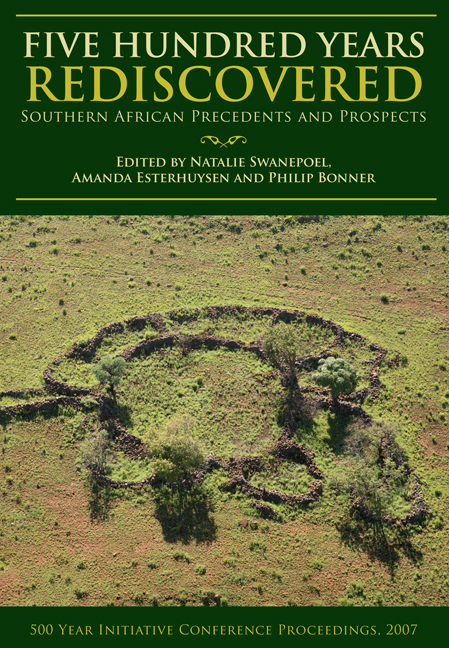Book contents
- Frontmatter
- Contents
- Preface
- 1 Introduction
- Section 1 Disciplinary Identities: Methodological Considerations
- Section 2 Material Identities
- Section 3 ‘Troubled Times’: Warfare, State Formation and Migration in the Interior
- 12 Rediscovering the Ndwandwe kingdom
- 13 Swazi oral tradition and Northern Nguni historical archaeology
- 14 Mfecane mutation in Central Africa: a comparison of the Makololo and the Ngoni in Zambia, 1830s-1898
- List of contributors
- Index
14 - Mfecane mutation in Central Africa: a comparison of the Makololo and the Ngoni in Zambia, 1830s-1898
from Section 3 - ‘Troubled Times’: Warfare, State Formation and Migration in the Interior
Published online by Cambridge University Press: 30 May 2019
- Frontmatter
- Contents
- Preface
- 1 Introduction
- Section 1 Disciplinary Identities: Methodological Considerations
- Section 2 Material Identities
- Section 3 ‘Troubled Times’: Warfare, State Formation and Migration in the Interior
- 12 Rediscovering the Ndwandwe kingdom
- 13 Swazi oral tradition and Northern Nguni historical archaeology
- 14 Mfecane mutation in Central Africa: a comparison of the Makololo and the Ngoni in Zambia, 1830s-1898
- List of contributors
- Index
Summary
Introduction
The Ngoni in Zambia and Malawi would agree with J.D. Omer-Cooper's (1995) assertion that ‘the Mfecane survives its critics’ in that the Mfecane still looms large in their own history. Omer–Cooper responded to revisionist views and accepted some major refinement of what caused, and how the main actors contributed to, a major historical process called the Mfecane in south-eastern Africa at the beginning of the 19th century. In Zambia, the Ngoni of Chipata are the only ethnic group whose recent origin is traced from the south of the country. They settled in what became the Chipata district in about 1870 where they usurped Chewa sovereignty. There are ten Ngoni Chiefs but two of them, namely Mishoro and Mshawa, are not of the Jere clan. Two additional Ngoni Chiefs, traditionally administered from Feni (the Ngoni headquarters in Chipata), are in the Mchinji district in Malawi (Lukhero 1985). Some of the justifications for settling there were the lush pastures and mountains that provided military defence. The topography was also a nostalgic reminder of Swaziland and Zululand. They share this history and celebrate it annually on the last Saturday of February together with Mbelwa's Ngoni who are in northern Malawi. These Ngoni groups were originally one of several refugee groups driven from their homeland by the Mfecane.
Another such group settled in the Western and Southern Provinces of Zambia. The Makololo, with their headquarters at Linyati in northern Botswana, asserted political and military power in western and southern Zambia in about 1838 and became a colonial power in Bulozi (Lozi country in the Zambezi flood plain and its eastern plateau). They extended power over the Masubiy Toka and Leya in the Livingstone area. The Lozi overthrew their colonisers in 1864 but have retained, to this day, southern Sesotho as their main language. The Lozi derive part of their identity from their Luba–Lunda origin (Gluckman 1951; Mainga 1973). They spoke Luyana before Kololo colonisation (Lubinda 1994). In contrast, the Ngoni of Chipata in Eastern Province of Zambia claim to speak Chingoni; a language which bears extremely limited resemblance to Sizulu or Siswati (Soko 1994; Miti 1996, 2006) despite oral and cultural evidence that their origins lie in Swaziland or Zululand.
- Type
- Chapter
- Information
- Five Hundred Years RediscoveredSouthern African precedents and prospects, pp. 257 - 272Publisher: Wits University PressPrint publication year: 2008



